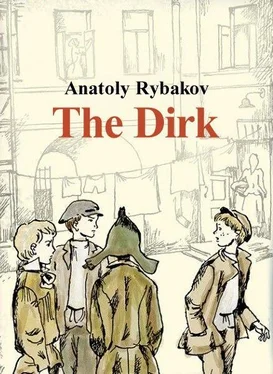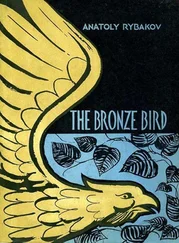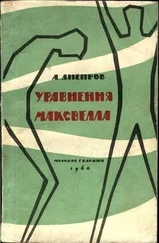Anatoly Rybakov - The Dirk
Здесь есть возможность читать онлайн «Anatoly Rybakov - The Dirk» весь текст электронной книги совершенно бесплатно (целиком полную версию без сокращений). В некоторых случаях можно слушать аудио, скачать через торрент в формате fb2 и присутствует краткое содержание. Город: Moscow, Год выпуска: 1954, Издательство: Foreign Languages Publishing House, Жанр: Детские приключения, Детектив, Исторические приключения, на английском языке. Описание произведения, (предисловие) а так же отзывы посетителей доступны на портале библиотеки ЛибКат.
- Название:The Dirk
- Автор:
- Издательство:Foreign Languages Publishing House
- Жанр:
- Год:1954
- Город:Moscow
- ISBN:нет данных
- Рейтинг книги:4 / 5. Голосов: 1
-
Избранное:Добавить в избранное
- Отзывы:
-
Ваша оценка:
- 80
- 1
- 2
- 3
- 4
- 5
The Dirk: краткое содержание, описание и аннотация
Предлагаем к чтению аннотацию, описание, краткое содержание или предисловие (зависит от того, что написал сам автор книги «The Dirk»). Если вы не нашли необходимую информацию о книге — напишите в комментариях, мы постараемся отыскать её.
The Dirk — читать онлайн бесплатно полную книгу (весь текст) целиком
Ниже представлен текст книги, разбитый по страницам. Система сохранения места последней прочитанной страницы, позволяет с удобством читать онлайн бесплатно книгу «The Dirk», без необходимости каждый раз заново искать на чём Вы остановились. Поставьте закладку, и сможете в любой момент перейти на страницу, на которой закончили чтение.
Интервал:
Закладка:
The sun was rising higher and higher in the sky; the shortening shadows pressed closer to the fences; the street lay hushed, hardly breathing in the torpid heat; and the air was stifling. The boys decided to go swimming and trooped off to the River Desna.
The narrow road, grooved by hardened ruts, wound across the fields that spread out in all directions in greenish-yellow squares. These seemed to sink into hollows and clamber the hills, gradually becoming round and moving off into the distance in a broad arc that supported the woods, the isolated barns, and the pensive clouds.
The wheat stood tall and still. The boys tore off the ears and chewed the grain, energetically spitting out the husks that stuck to their palates. There was a rustling in the wheat and frightened birds flew up into the air almost from under their feet.
At the river's edge the boys chose a sandy spot, undressed, and jumped into the water, splashing it up in huge fountains. They swam, dived, wrestled, jumped from a rickety bridge, and finally climbed back to the bank and dug themselves into the hot sand.
"Misha, is there a river in Moscow?" Genka asked.
"Yes. The Moscow River. I've already told you that a thousand times."
"You mean it flows through the city?"
"Yes."
"Then how can you swim in it?"
"In trunks. They won't let you near a mile of it without trunks. The mounted militia watches."
Genka smirked in disbelief.
"What are you smirking for?" Misha said getting angry. "You haven't seen anything except your Revsk, and you think you're smart!"
He fell silent, watching a drove of horses approach the river. "Now you tell me: what's the smallest horse?" he asked. "A foal," Genka replied without hesitation.
"There, you don't know! The pony's the smallest horse. There are Shetland ponies, they're the size of dogs; while Japanese ponies are like cats almost."
"You're fibbing!"
"Who, me? If you'd been to a circus just once you wouldn't argue. You haven't been to a circus, have you? Own up: you haven't?... There you are. And you're arguing!"
Genka stopped to think for a moment.
"A horse like that's no good," he said, "can't use it in the cavalry, or anywhere else."
"What's the cavalry got to do with it? D'you think people fight only on horseback? If you want to know, one sailor's worth three cavalrymen."
"I'm not saying anything about sailors," Genka said, "but you can't do without cavalry. Nikitsky's gang is all mounted."
"Well, what about it!" Misha said with a contemptuous curl of his lip. "Polevoy'll catch that Nikitsky soon anyway."
"That's not so simple," Genka contended, "they've been trying to get him a whole year now, and they can't."
"They will," Misha said confidently.
"Easy to say," Genka looked up, "but he's wrecking trains every day. Father's already afraid of driving his engine."
"Never mind, they'll catch him."
Misha yawned, dug deeper into the sand and shut his eyes. Genka was also dozing. They did not feel like arguing any longer in the heat. The silent steppe was lazily withdrawing into the horizon as though to escape the scorching sun.
Chapters 3
AFFAIRS AND DREAMS
Genka went home to dinner, but Misha went to the crowded, noisy Ukrainian market.
He wandered about the market for a long time, looking at the carts piled high with green cucumbers, red tomatoes, and wicker-baskets of berries; the pink, shrilly squealing sucking-pigs; the white geese flapping their great wings; the sluggish oxen endlessly chewing the cud, their sticky saliva dribbling to the ground.
As he walked through the market Misha remembered the Moscow bread and the watery milk bartered for potato peel. He longed for Moscow, its tram-cars, and evening lights.
He stopped before an invalid rolling three beads on a bench. Each was of a different colour-red, white, and black. The man covered one of them with a thimble and offered a prize to anyone guessing its colour. But the right colour was elusive.
"Friends!" the invalid said, appealing to the losers. "If I start losing to everyone I'll have to sell my last leg. You've got to under stand that."
While Misha was examining the beads, someone suddenly put a hand on his shoulder. Turning round he saw Grandmother standing behind him.
"Where on earth have you been the whole day?" she asked sternly, clinging tenaciously to Misha's shoulder.
"Swimming," Misha mumbled.
"Swimming!" Grandmother repeated. "How do you like that? He was swimming-well, we'll speak about it at home."
She gave him her basket of purchases and marched him off.
Grandmother walked in silence. She smelled of onions, garlic and of something fried, something boiled, like all the smells in the kitchen.
"What'll they do to me?" Misha thought as he walked beside Grandmother. He was in a bit of a jam, he could see that. Against him there were Grandmother and Uncle Senya. For him-Grandfather and Polevoy. But what if Polevoy was not at home? That would leave only Grandfather. And what if Grandfather was sleeping? That would leave no one to stand up for him, and give Grand mother and Uncle Senya a free hand. They would take it in turn lecture him. Uncle Senya would lecture and Grandmother would rest, and then Grandmother would take over and Uncle Senya would rest.
There was hardly anything they would leave unsaid! They would call him bad-mannered, say he would never amount to anything; that he was a disgrace to the family; that he was a trial to his mother and that if he had not yet driven her to her grave he would do so in the next few days (he felt sure they would say that, even though Mother was living in Moscow and he had not seen her for two months); that it was amazing how the earth held him at all-and many other things like that...
When they came home Misha put the basket in the kitchen and went to the dining-room. Grandfather was sitting near the window listening to Uncle Senya discussing the political situation, as he reclined on the sofa and smoked a cigarette. They did not even so much as glance at Misha when he entered. That was on purpose! To make Misha feel small, to show that looking at him was a waste of time. That was Uncle Senya's way of torturing people. As far as Misha was concerned he could do as he liked, it was even better that way, because by the time Uncle Senya was ready to deliver his lecture Polevoy would come home. Misha sat on a chair and listened to their conversation.
A few words were enough to tell him that Uncle Senya was raising a panic again. Bandit Makhno had occupied a number of towns, he said, and Antonov, another bandit, had approached the outskirts of Tambov. Fancy getting panicky over that! Last year, when the White Poles had occupied Kiev and Wrangel had broken through into the Donbas, Uncle Senya had also started to panic. Well, what had happened then? The Red Army had crushed the lot. Before that there had been Denikin, Kolchak, Yudenich (Whiteguard generals who led the counter-revolution in the U.S.S.R. during the Civil War.-Ed.), and other Whiteguard generals. The Red Army had smashed them all. And it would lick these, too..
From Makhno and Antonov, Uncle Senya turned to Nikitsky.
"You can't call him a bandit," Uncle Senya said, unbuttoning the collar of his student jacket. "Moreover, they say he's a man of culture, a former naval officer."
What? Nikitsky not a bandit? Misha almost choked with indignation. Why, Nikitsky was burning down villages and killing Communists, member of the Komsomol, (All-Union Lenin Young Communist League.-Tr.) and workers! What was bandit then? It was disgusting to listen to Uncle Senya's prattle.
Polevoy finally came. Misha sighed with relief. Now his punishment would be put off till to-morrow, at the earliest.
Polevoy took off his jacket and washed. Then everyone sat down to supper. His laughter filled the room. He called Grandfather-father and Grandmother-mother; he winked playfully at Misha and addressed him as Mikhail Grigoryevich. After supper they went out of the house and sat on the porch steps.
Читать дальшеИнтервал:
Закладка:
Похожие книги на «The Dirk»
Представляем Вашему вниманию похожие книги на «The Dirk» списком для выбора. Мы отобрали схожую по названию и смыслу литературу в надежде предоставить читателям больше вариантов отыскать новые, интересные, ещё непрочитанные произведения.
Обсуждение, отзывы о книге «The Dirk» и просто собственные мнения читателей. Оставьте ваши комментарии, напишите, что Вы думаете о произведении, его смысле или главных героях. Укажите что конкретно понравилось, а что нет, и почему Вы так считаете.












